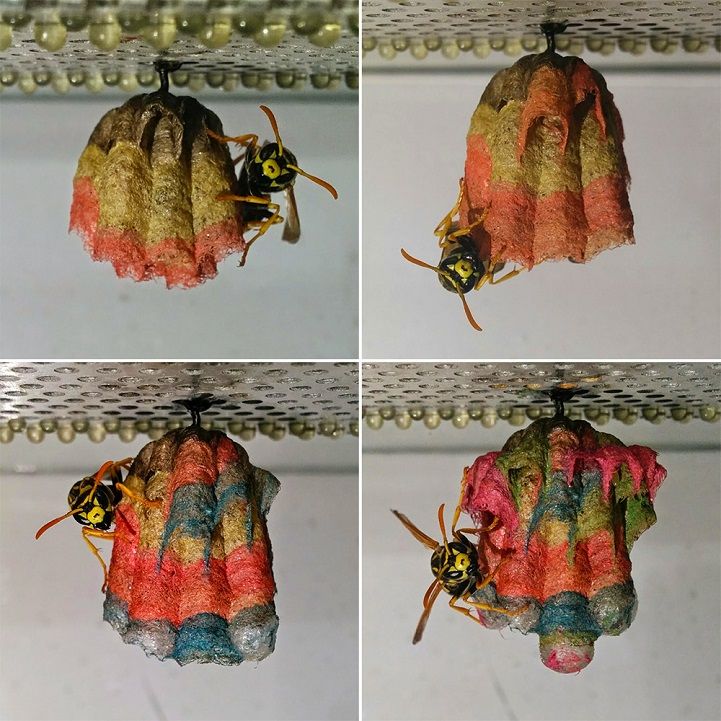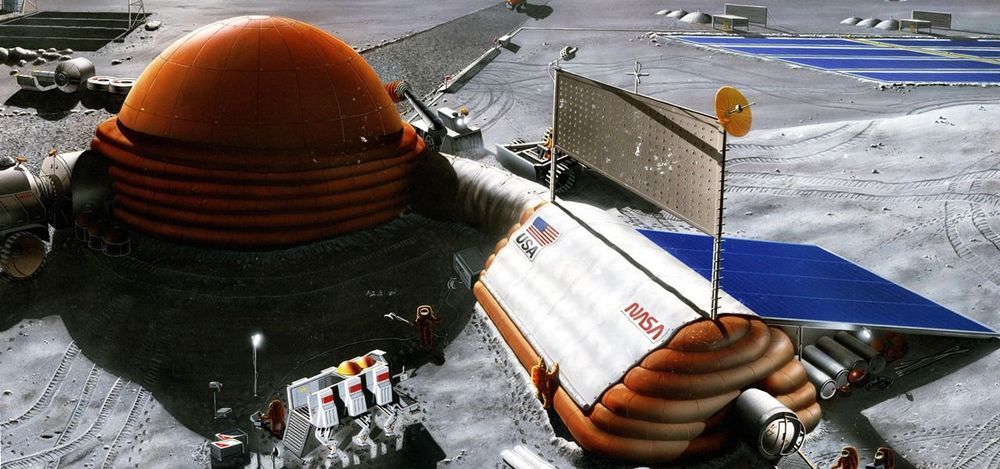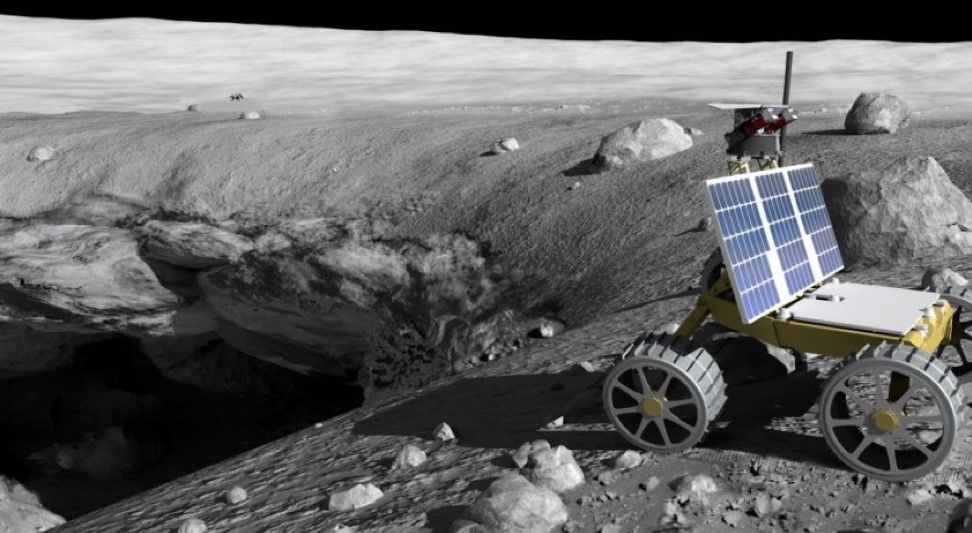Vital-Radio can use vital sign information to enhance our health-awareness, answering questions like “Do my breathing and heart rates reflect a healthy lifestyle?”, “Does my child breathe normally during sleep?” or “Does my elderly parent experience irregular heartbeats?”
Category: habitats – Page 101

Wasp Colony Given Colored Construction Paper Builds an Amazing Rainbow Nest
Biology student Mattia Menchetti performed an experiment on a colony of European paper wasps which yielded some very colorful results. Paper wasps are known for their water-resistant nests constructed out of fibers of dead wood and plant stems which have been chewed into a pulp and mixed with saliva. Menchetti provided a captive colony of these wasps with colored paper and in a beautiful display of entomological artwork, the insects produced a vibrant, rainbow nest.
Menchetti began by giving the wasps bits of yellow paper, and slowly introduced more and more multicolored sheets. The colony happily made use of the material to construct a sturdy, technicolor home to house their larvae. Paper wasps are some of the most common wasp species, typically seen in backyards around North America. They tend to establish a single nest across multiple seasons and generations; for this reason, their homes must be incredibly durable. A protein found in the saliva of these wasps is actually so effective at waterproofing their nests that it has been used by scientists to construct a biodegradable drone.
Menchetti has performed a variety of scientific studies about insects, mammals, and the ecology of alien species, which he explains in further detail on his website.

NASA Identifies What Kind of Fungi Could Grow in a Mars Habitat
Wherever there are people, the party is sure to follow. Well, a party of microbes, at least. That is what scientists at NASA’s Jet Propulsion Laboratory have found after a 30-day microbial observation of the inflatable lunar/Mars analog habitat (IMAH).
What is an “analog habitat?” For NASA, analogs are experiments and processes that are developed and tested on the ground in the confines of special laboratories on Earth. Because of the danger, distance, and expense of space flight, it makes good sense to test out conditions that space travelers will face — before they ever launch.
For NASA, there are five different space stresses evaluated in analog missions. These stresses are the subject of analog missions that often make use of a carefully designed habitat to replicate space conditions. These five challenges are:

How Russia’s Citizens Can’t Escape Their Largest Tech Company
Five years ago, Yandex was just a search engine trying hard to fend off Google in its local market. Since then it has bought Uber Technologies Inc.’s Russia business, built its voice assistant into cars and home appliances, and more than doubled its revenue. Yandex now claims to have 108 million monthly users, which is about 75% of Russia’s population.
I’m woken up by an alarm on a home speaker designed by Yandex NV. I go to work in Yandex taxi listening to the company’s music-streaming service. My lunch is delivered by Yandex. Eats. I buy sneakers on the company’s Beru marketplace, and catch up on a series on its Kinopoisk smart-TV app in the evening.
You get the picture. Not so long ago, most decisions in Russia were decided by the state. Now, Russia’s largest tech company can cater to your every need.


The Baron Trump 3 In 1 Collection: The Last President (Or 1900), Travels And Adventures Of Little Baron Trump, Baron Trumps Marvellous Underground Journey
This collection contains the THREE novels by INGERSOLL LOCKWOOD that have surprised the world of the XXI century. This author wrote over 120 years ago, during the 1890‘s, these three novels, in which the characters are first, a kid, whose name was Baron Trump, and his Master is Don; and a separate novel about a president who resides in 5th avenue, New York, in a tower with his name, who surprisingly wins an election…The Baron Trump novels recount the adventures of the German boy Wilhelm Heinrich Sebastian Von Troomp, who goes by “Baron Trump”, as he discovers weird underground civilizations, offends the natives, flees from his entanglements with local women, and repeats this pattern until arriving back home at Castle Trump. Chris Riotta noted in Newsweek that Baron Trump’s adventures begin in Russia, and also mentioned another book of Ingersoll’s, The Last President, in which the president’s home city of New York is riven by protests against a rigged presidential election. Jaime Fuller wrote in Politico that Baron Trump is “precocious, restless, and prone to get in trouble”, often mentions his massive brain, and has a personalized insult for most people he meets. These novels, and some of its phrases and situations, really make people wonder if there are authors who have a window to the future, true prophets like Verne and his “From Earth to the Moon”, Poe with his Arthur Gordon Pim (a story that occurred with names and last names 50 years later); and Robertson in Futility or the Wreck of the Titan, a novel about the wreck of the Titanic, with locations, names and descriptions, written 20 years! before the actual events.


Inside Life on the Frontlines of the Ebola Crisis in Congo
On the frontlines of the Ebola response are local Congolese workers with temporary job contracts. They are often driven into this work by economic necessity, as well as a desire to help.
Belinda Landu, a tall 28-year-old with long hair who radiates confidence, was making a meager living as a tailor in capital city Kinshasa before the outbreak. While visiting her mother in Beni last August, she spotted an advertisement for a health promoter. Today, she’s passionate about her role: decontaminating the houses of confirmed Ebola patients. “I want to stop the spread of the epidemic,” she said. “My family understand I work here to help people. If we get Ebola people will help us too.”
When she arrives at the scene of a recent diagnosis, Landu changes into a full protective outfit, including a full plastic bodysuit, mask, hairnet, gumboots, and both latex and rubber gloves, and begins the slow process of covering everything — inside and outside a house — with a chlorinated spray. Locals gather around to stare at her. They’re often terrified, she says, though she tries to be kind — speaking to them before she starts, and even stopping to play soccer with children after she changes out of her outfit.
The Mars Homes That NASA Awarded $500,000
These are the Mars homes that NASA awarded $500,000.
